Guhong Chen
Beyond Quantity: Trajectory Diversity Scaling for Code Agents
Feb 03, 2026Abstract:As code large language models (LLMs) evolve into tool-interactive agents via the Model Context Protocol (MCP), their generalization is increasingly limited by low-quality synthetic data and the diminishing returns of quantity scaling. Moreover, quantity-centric scaling exhibits an early bottleneck that underutilizes trajectory data. We propose TDScaling, a Trajectory Diversity Scaling-based data synthesis framework for code agents that scales performance through diversity rather than raw volume. Under a fixed training budget, increasing trajectory diversity yields larger gains than adding more trajectories, improving the performance-cost trade-off for agent training. TDScaling integrates four innovations: (1) a Business Cluster mechanism that captures real-service logical dependencies; (2) a blueprint-driven multi-agent paradigm that enforces trajectory coherence; (3) an adaptive evolution mechanism that steers synthesis toward long-tail scenarios using Domain Entropy, Reasoning Mode Entropy, and Cumulative Action Complexity to prevent mode collapse; and (4) a sandboxed code tool that mitigates catastrophic forgetting of intrinsic coding capabilities. Experiments on general tool-use benchmarks (BFCL, tau^2-Bench) and code agent tasks (RebenchT, CodeCI, BIRD) demonstrate a win-win outcome: TDScaling improves both tool-use generalization and inherent coding proficiency. We plan to release the full codebase and the synthesized dataset (including 30,000+ tool clusters) upon publication.
IPBench: Benchmarking the Knowledge of Large Language Models in Intellectual Property
Apr 22, 2025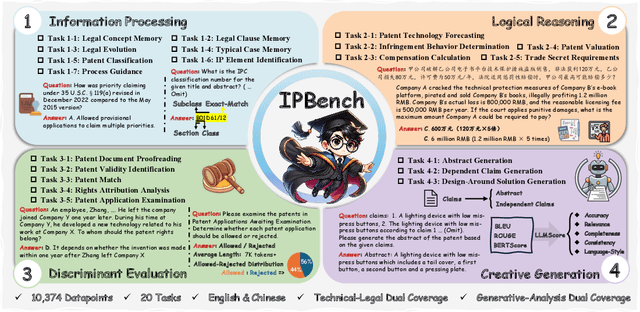
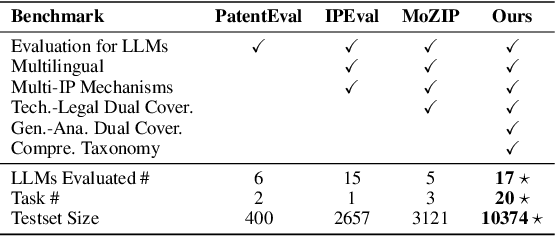
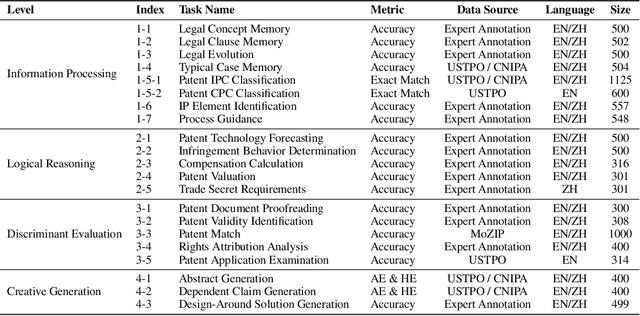
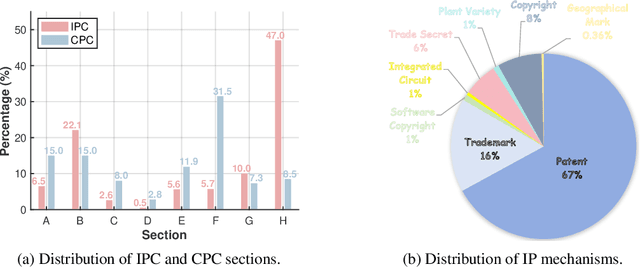
Abstract:Intellectual Property (IP) is a unique domain that integrates technical and legal knowledge, making it inherently complex and knowledge-intensive. As large language models (LLMs) continue to advance, they show great potential for processing IP tasks, enabling more efficient analysis, understanding, and generation of IP-related content. However, existing datasets and benchmarks either focus narrowly on patents or cover limited aspects of the IP field, lacking alignment with real-world scenarios. To bridge this gap, we introduce the first comprehensive IP task taxonomy and a large, diverse bilingual benchmark, IPBench, covering 8 IP mechanisms and 20 tasks. This benchmark is designed to evaluate LLMs in real-world intellectual property applications, encompassing both understanding and generation. We benchmark 16 LLMs, ranging from general-purpose to domain-specific models, and find that even the best-performing model achieves only 75.8% accuracy, revealing substantial room for improvement. Notably, open-source IP and law-oriented models lag behind closed-source general-purpose models. We publicly release all data and code of IPBench and will continue to update it with additional IP-related tasks to better reflect real-world challenges in the intellectual property domain.
AutoPatent: A Multi-Agent Framework for Automatic Patent Generation
Dec 13, 2024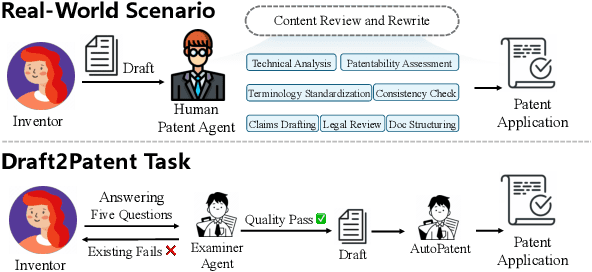
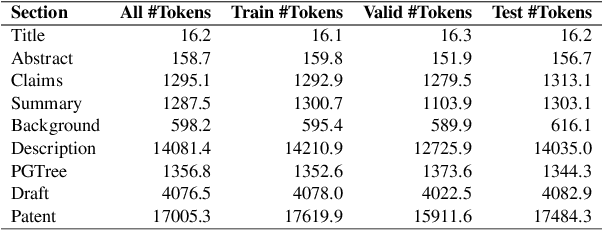
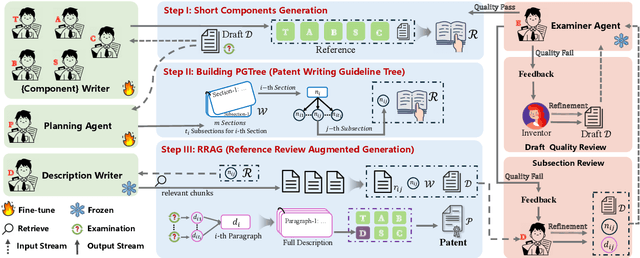
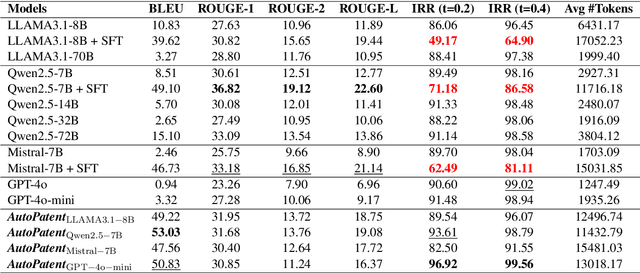
Abstract:As the capabilities of Large Language Models (LLMs) continue to advance, the field of patent processing has garnered increased attention within the natural language processing community. However, the majority of research has been concentrated on classification tasks, such as patent categorization and examination, or on short text generation tasks like patent summarization and patent quizzes. In this paper, we introduce a novel and practical task known as Draft2Patent, along with its corresponding D2P benchmark, which challenges LLMs to generate full-length patents averaging 17K tokens based on initial drafts. Patents present a significant challenge to LLMs due to their specialized nature, standardized terminology, and extensive length. We propose a multi-agent framework called AutoPatent which leverages the LLM-based planner agent, writer agents, and examiner agent with PGTree and RRAG to generate lengthy, intricate, and high-quality complete patent documents. The experimental results demonstrate that our AutoPatent framework significantly enhances the ability to generate comprehensive patents across various LLMs. Furthermore, we have discovered that patents generated solely with the AutoPatent framework based on the Qwen2.5-7B model outperform those produced by larger and more powerful LLMs, such as GPT-4o, Qwen2.5-72B, and LLAMA3.1-70B, in both objective metrics and human evaluations. We will make the data and code available upon acceptance at \url{https://github.com/QiYao-Wang/AutoPatent}.
AgentCourt: Simulating Court with Adversarial Evolvable Lawyer Agents
Aug 15, 2024



Abstract:In this paper, we present a simulation system called AgentCourt that simulates the entire courtroom process. The judge, plaintiff's lawyer, defense lawyer, and other participants are autonomous agents driven by large language models (LLMs). Our core goal is to enable lawyer agents to learn how to argue a case, as well as improving their overall legal skills, through courtroom process simulation. To achieve this goal, we propose an adversarial evolutionary approach for the lawyer-agent. Since AgentCourt can simulate the occurrence and development of court hearings based on a knowledge base and LLM, the lawyer agents can continuously learn and accumulate experience from real court cases. The simulation experiments show that after two lawyer-agents have engaged in a thousand adversarial legal cases in AgentCourt (which can take a decade for real-world lawyers), compared to their pre-evolutionary state, the evolved lawyer agents exhibit consistent improvement in their ability to handle legal tasks. To enhance the credibility of our experimental results, we enlisted a panel of professional lawyers to evaluate our simulations. The evaluation indicates that the evolved lawyer agents exhibit notable advancements in responsiveness, as well as expertise and logical rigor. This work paves the way for advancing LLM-driven agent technology in legal scenarios. Code is available at https://github.com/relic-yuexi/AgentCourt.
 Add to Chrome
Add to Chrome Add to Firefox
Add to Firefox Add to Edge
Add to Edge